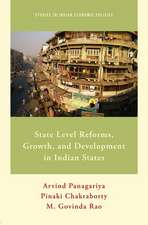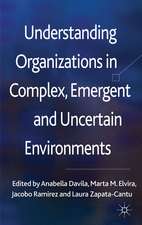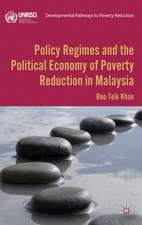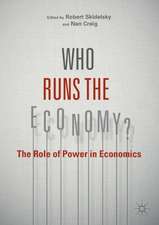Rentier Capitalism: Disorganised Development and Social Injustice in Pakistan
Autor S. Ahmeden Limba Engleză Hardback – 29 feb 2016
Rentier Capitalism sheds light on the reasons behind Pakistan's failure to bring prosperity to its people when compared to other East Asian and South-East Asian countries.
Preț: 641.03 lei
Preț vechi: 754.15 lei
-15% Nou
Puncte Express: 962
Preț estimativ în valută:
122.66€ • 128.41$ • 101.49£
122.66€ • 128.41$ • 101.49£
Carte tipărită la comandă
Livrare economică 07-21 aprilie
Preluare comenzi: 021 569.72.76
Specificații
ISBN-13: 9781137554468
ISBN-10: 1137554460
Pagini: 230
Ilustrații: XV, 230 p.
Dimensiuni: 140 x 216 x 16 mm
Greutate: 0.44 kg
Ediția:1st ed. 2016
Editura: Palgrave Macmillan UK
Colecția Palgrave Macmillan
Locul publicării:London, United Kingdom
ISBN-10: 1137554460
Pagini: 230
Ilustrații: XV, 230 p.
Dimensiuni: 140 x 216 x 16 mm
Greutate: 0.44 kg
Ediția:1st ed. 2016
Editura: Palgrave Macmillan UK
Colecția Palgrave Macmillan
Locul publicării:London, United Kingdom
Cuprins
Preface
Acknowledgments
Introduction
1. Development, Social Justice and the Limits of Public Policy
2. Why has Pakistan's Economy Under-performed?
3. The Social Sectors in Pakistan: A Story of Neglect
4. The Cultural Setting: Patronage and Rent-seeking
5. The Political Economy of Pakistan
6. Regional Cooperation in South and South-East Asia
7. The State, Private Enterprise and Development
8. Democracy and Development: Diagnosing Poor Governance
9. An Agenda for Pakistan's Future
Epilogue
Appendices
Bibliography
Index
Acknowledgments
Introduction
1. Development, Social Justice and the Limits of Public Policy
2. Why has Pakistan's Economy Under-performed?
3. The Social Sectors in Pakistan: A Story of Neglect
4. The Cultural Setting: Patronage and Rent-seeking
5. The Political Economy of Pakistan
6. Regional Cooperation in South and South-East Asia
7. The State, Private Enterprise and Development
8. Democracy and Development: Diagnosing Poor Governance
9. An Agenda for Pakistan's Future
Epilogue
Appendices
Bibliography
Index
Notă biografică
Shahid Ahmed is a former United Nations official who has served as an Economist in the Economic and Social Commission for Asia and the Pacific in Bangkok. He has also worked in a senior capacity in Pakistan's central bank, in the Competition Commission of Pakistan and acquired extensive hands-on experience of international finance while working in the City in the UK in the 1970s and 1980s.
Textul de pe ultima copertă
Since the early 1950s East Asia (China, Taiwan and South Korea) and South-East Asia (Indonesia, Malaysia, Thailand and Vietnam) have, despite war and other challenges, managed to transform the lives of their people, whereas South Asia (India, Pakistan, Bangladesh and Sri Lanka) has lagged behind. The success of East and South-East Asia has not been accidental – it has been driven by action to reduce rural poverty, by the provision of decent education and health services to the people, and by high quality physical and institutional infrastructure, such as roads, ports and railways, and targeted support from the State to develop particular industries. In contrast, Pakistan has never confronted the problem of rural poverty, nor invested in public services. This failure is a reflection of the power of the landed class and its urban allies. This has now taken the form of widespread rent-seeking in the economy with the country's ruling elite sharing out the spoils amongst themselves rather than taking measures to grow the size of the economy so that all might share in the resulting prosperity.
Rentier Capitalism sheds light on the reasons behind Pakistan's failure to bring prosperity to its people when compared to other East Asian and South-East Asian countries.
Rentier Capitalism sheds light on the reasons behind Pakistan's failure to bring prosperity to its people when compared to other East Asian and South-East Asian countries.













